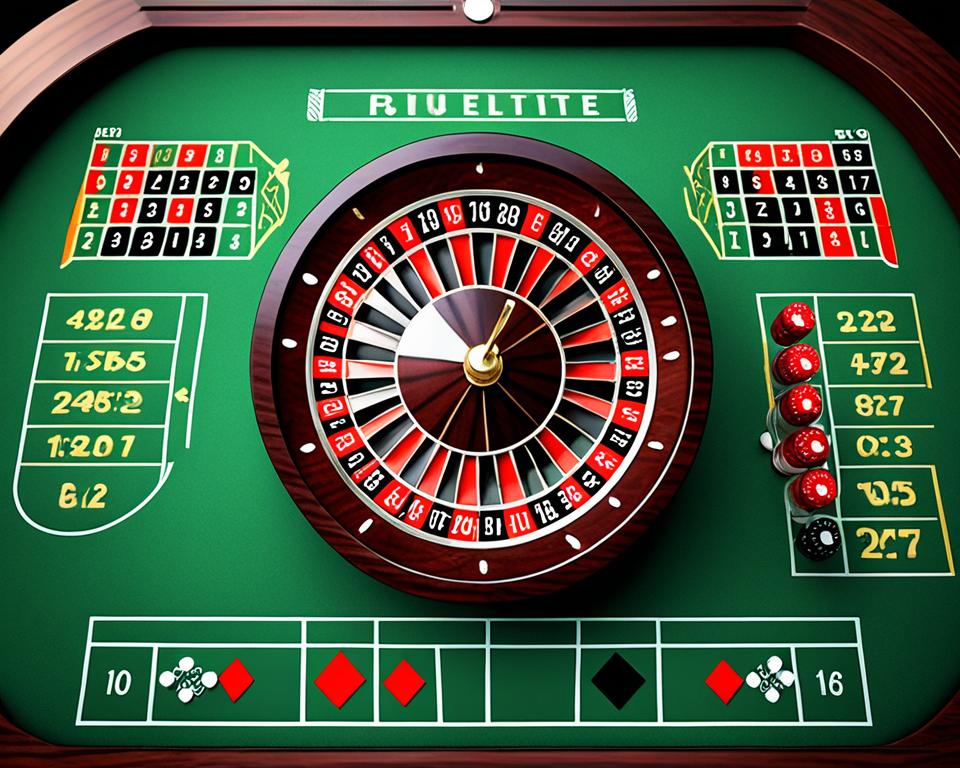Roulette is an intriguing game that is played throughout the world. The large payoffs that are possible for small wagers stimulate the interest of both expert and novice players. However, understanding the basic rules of roulette is essential for beginners to fully enjoy this thrilling casino game.
Key Takeaways
- Start by understanding the goal of roulette: predicting the winning number.
- There are different types of bets in roulette, each offering different odds and payouts.
- To place a bet, simply place your chips on the corresponding area of the table.
- It’s important to understand the payout structure in roulette to maximize your winnings.
- There are different variations of roulette, including American, European, and French, each with its own unique rules.
The Goal of Roulette: Predicting the Winning Number
In the game of roulette, the ultimate goal is to predict the winning number. To achieve this, players must understand the roulette game rules for beginners, grasp the concepts behind roulette rules explained for novices, and develop a solid understanding of the game’s mechanics. By mastering these fundamentals, players can enhance their chances of success at the roulette table.
The roulette wheel is the pivotal element in determining the outcome of each spin. It consists of numbered slots, typically ranging from 0 to 36. The position of the winning number is determined by where the ball lands on the wheel after it’s set in motion by the dealer. Players must strategically place their bets on the table, selecting various betting options that correspond to specific numbers or groups of numbers on the wheel.
When the ball comes to rest in a numbered slot, the winning number is revealed, and those who correctly predicted the outcome celebrate their victory. This thrilling anticipation and the potential for substantial winnings make roulette an exhilarating game of chance.
Different Types of Bets in Roulette
In roulette, there are various types of bets that players can make. Understanding the different types of bets is crucial when learning how to play roulette. Let’s explore the different betting options available:
Straight Bets
A straight bet is when a player places a wager on a single number. If the ball lands on the chosen number, the player wins. Straight bets offer the highest payout of 35 to 1, making them enticing for players seeking big wins. However, they also carry the highest risk.
Group Bets
Group bets involve placing wagers on multiple numbers at once. There are several types of group bets, including:
- Split Bet: This bet is placed on two adjacent numbers on the table. If either of the numbers is the winning number, the player wins. The payout for a split bet is 17 to 1.
- Street Bet: In a street bet, the player bets on three consecutive numbers in a row. If any of the chosen numbers win, the player receives a payout of 11 to 1.
- Corner Bet: This bet covers four numbers that meet at a corner on the table. If any of the four numbers win, the player wins with a payout of 8 to 1.
- Line Bet: A line bet involves betting on six numbers by placing the chip on the intersection of two rows on the table. If any of the six numbers win, the player receives a payout of 5 to 1.
Even or Odd Bets
Even or odd bets are self-explanatory. Players can wager on whether the winning number will be even or odd. These bets have a 1 to 1 payout, meaning if the player wins, they will double their wager.
Color Bets
Color bets refer to betting on either red or black numbers. The wheel alternates between red and black slots, excluding the green zero slots. Like even or odd bets, color bets also have a 1 to 1 payout.
By understanding different types of bets in roulette, beginners can strategize their gameplay and make informed decisions. Remember to assess the risk and potential payouts associated with each bet type, and play responsibly.
How to Place a Bet in Roulette
Placing a bet in roulette is straightforward and exciting. Once you have familiarized yourself with the basic rules, it’s time to test your luck and make your predictions. Here’s a step-by-step guide on how to place your bets at the roulette table.
Roulette Table Layout
Before placing your bets, it’s essential to understand the layout of the roulette table. The table is divided into sections, each representing different types of bets. Here are the common betting options:
| Betting Option | Description |
|---|---|
| Inside Bets | Bets placed on specific numbers, groups of numbers, or combinations. |
| Outside Bets | Bets placed on larger groups of numbers, such as red or black, odd or even, or high or low numbers. |
| Neighbor Bets | Bets placed on a specific number and its neighboring numbers on the wheel. |
By understanding the different betting options, you can choose the strategy that suits your preferences and risk tolerance.
Placing Your Bets
Once you have decided on your betting strategy, it’s time to place your bets. Here’s how:
- Exchange your money for roulette chips from the dealer.
- Select the chips representing the value of your bet.
- Place your chips on the corresponding area of the table to indicate your bet.
Remember that each type of bet has specific placement areas on the table. Take a moment to familiarize yourself with the layout to accurately place your chips.
Spinning the Wheel
Once all the players have placed their bets, the dealer will spin the roulette wheel in one direction and simultaneously launch the ball in the opposite direction. As the wheel and ball slow down, the ball will eventually come to rest in one of the numbered slots.
“The roulette wheel spins, fortune waits in anticipation, and the ball dances around the numbers. It’s your moment to claim your win or watch as luck slips away.”
The outcome of the game is determined by the number on which the ball lands. If the winning number corresponds to any of your bets, you win!
Now that you know how to place a bet in roulette, it’s time to try your luck and enjoy the thrill of the game. Remember to gamble responsibly and have fun!
Understanding Roulette Payouts
When it comes to roulette, understanding the payout structure is crucial for beginners to make the most of their winnings. Different types of bets in roulette offer varying payouts, and knowing the odds can help players make informed choices at the table.
One of the most popular types of bets in roulette is the straight bet, where players place their chips on an individual number. This type of bet has the highest payout of 35 to 1. In other words, if you bet on a specific number and it hits, you will receive 35 times your original wager. It’s a high-risk, high-reward option that can lead to big wins for those feeling lucky.
For players who prefer lower-risk bets, there are options like even/odd or red/black. These bets have a payout of 1 to 1, meaning if you bet $10 and win, you will receive your original $10 back, plus an additional $10 in winnings. While the payout is lower compared to straight bets, these types of bets offer higher chances of winning, making them popular choices for beginners.
Quote: “Understanding the payout structure is essential for beginners to maximize their winnings.”
To summarize, roulette offers a variety of payout options depending on the type of bet made. Straight bets have the highest payout of 35 to 1, while other bets like even/odd or red/black offer a payout of 1 to 1. By understanding these payouts, beginners can make strategic decisions and enjoy the thrill of the game while maximizing their chances of winning.
Variations of Roulette: American, European, and French
When it comes to the game of roulette, there are three main variations that beginners should be familiar with: American, European, and French roulette. Each variation has its own unique features and rules that can significantly affect the odds and gameplay. Let’s take a closer look at each variation:
American Roulette
American roulette is one of the most popular variations of the game, especially in the United States. In this version, the wheel has 38 slots, including the numbers 1-36, a single zero (0), and a double zero (00). The presence of the double zero increases the house edge, making it slightly more challenging for players to win.
European Roulette
European roulette is the most commonly played variation in Europe and around the world. In this version, the wheel has 37 slots, including the numbers 1-36 and a single zero (0). The absence of the double zero gives European roulette a lower house edge compared to its American counterpart. This means that players have slightly better odds of winning.
French Roulette
French roulette closely resembles European roulette in terms of gameplay and wheel layout. However, there are additional rules that set it apart. One notable feature is the “La Partage” rule, which refunds half of the wager for even-money bets if the ball lands on zero. This rule further reduces the house edge, making French roulette even more favorable for players.
Here’s a visual comparison of the wheel layouts for each variation:
| American Roulette | European Roulette | French Roulette |
|---|---|---|
 |
As you can see, the main difference lies in the number of slots and the presence of the double zero. It’s important for beginners to be aware of these variations and their impact on the game’s odds. Understanding the differences will help players make informed decisions and choose the variation that aligns with their preferences and playing style.
Roulette Betting Strategies: Tips for Beginners
When it comes to playing roulette, having a solid betting strategy can make a world of difference. While roulette is ultimately a game of chance, employing certain strategies can help beginners minimize losses and maximize their winnings. Here are some key tips for new players to consider:
The Martingale System
The Martingale system is one of the most popular strategies in roulette. It’s a simple progression betting system where players double their bet after every loss. The goal is to eventually recover all previous losses and secure a small profit. This strategy works best when betting on even money options like red/black or even/odd.
The D’Alembert System
The D’Alembert system is another commonly used strategy in roulette. It operates on the principle of balancing losses and wins. With this strategy, players increase their bet by one unit after a loss and decrease it by one unit after a win. The goal is to bring the overall losses and wins closer to each other over time, minimizing the impact of consecutive losses.
The Fibonacci System
The Fibonacci system is based on the famous Fibonacci sequence, where each number is the sum of the two preceding numbers. In roulette, players increase their bet according to this sequence after a loss and decrease it after a win. This strategy aims to recover losses progressively and capitalize on winning streaks.
Remember, while these strategies can enhance your gameplay, they do not guarantee consistent wins. Roulette is ultimately a game of chance, and outcomes are unpredictable. It’s essential to gamble responsibly and set limits for yourself.
By familiarizing yourself with these betting strategies, you can approach roulette with a more strategic mindset. Experiment with different strategies to find what works best for you and always remember to enjoy the thrill of the game.
| Betting Strategy | Description |
|---|---|
| Martingale | A progression system where players double their bet after every loss to recover previous losses and secure a small profit. |
| D’Alembert | A strategy that aims to balance losses and wins by increasing the bet by one unit after a loss and decreasing it after a win. |
| Fibonacci | Based on the famous Fibonacci sequence, players increase the bet according to the sequence after a loss and decrease it after a win. |
Table Limits and Etiquette in Roulette
When playing roulette, it’s important for beginners to not only understand the basic rules but also be aware of table limits and follow proper etiquette. These aspects contribute to a smooth and enjoyable gaming experience for everyone involved.
Table Limits:
Every roulette table has minimum and maximum bet limits that players must adhere to. These limits are set by the casino and are in place to ensure that the game remains fair and balanced for all participants. Beginners should take note of these limits before placing their bets to avoid any surprises or misunderstandings.
Some tables may have higher minimum bets, particularly in high-end or VIP sections of the casino, while others may accommodate lower minimum bets for players who prefer smaller wagers. Conversely, the maximum bet limit sets a cap on the amount that can be wagered on a single betting option.
Understanding the table limits allows beginners to choose a table that aligns with their preferred betting range and budget, ensuring a comfortable and enjoyable gaming experience.
Table Limits Example:
| Table Type | Minimum Bet | Maximum Bet |
|---|---|---|
| American Roulette | $5 | $500 |
| European Roulette | $1 | $300 |
| French Roulette | $10 | $1,000 |
Etiquette:
Proper etiquette is crucial when playing roulette to maintain a respectful and harmonious gaming environment. Here are a few etiquette guidelines beginners should keep in mind:
- Do not touch the wheel: Roulette is a game of chance, and the wheel’s movement should be left to the dealer. Avoid touching the wheel or attempting to influence its outcome in any way.
- Avoid interfering with the game: Once the dealer has spun the wheel, it’s important to let the game unfold naturally. Refrain from reaching across the table or making any disruptive actions that may affect the flow of play.
- Respect other players: Be mindful of the space and comfort of other players at the table. Avoid overcrowding or unnecessary conversations that may distract or disrupt others.
- Be polite to the dealer: The dealer is there to facilitate the game and ensure fairness. Treat them with respect and courtesy throughout the gameplay.
- Know the game: Before sitting at a roulette table, make sure you have a basic understanding of the rules and betting options. This will help you make informed decisions and prevent any unnecessary delays or confusion.
By following these etiquette guidelines, beginners can contribute to a positive and enjoyable roulette experience for themselves and others at the table.
Quote:
“Playing roulette is not just about knowing the rules and placing bets. It’s equally important to understand the table limits and adhere to proper etiquette. These aspects ensure a smooth and respectful gaming atmosphere where everyone can have a great time.” – John Smith, Roulette Expert
Now that you have a better understanding of table limits and etiquette in roulette, you can confidently approach the game and enjoy your time at the table.

Online Roulette vs. Live Roulette: Pros and Cons
When it comes to playing roulette, beginners have the option to choose between online roulette and live roulette in a casino setting. Each option has its own advantages and disadvantages, so it’s important for players to consider their preferences and needs before making a decision.
The Pros of Online Roulette
- Convenience: Online roulette allows players to enjoy the game from the comfort of their own homes, at any time that suits them.
- Wide Range of Variations: Online casinos offer a vast selection of roulette variations, allowing players to explore different versions of the game and find the one they enjoy the most.
- Lower Minimum Bets: Online roulette often offers lower minimum bet limits compared to live casinos, making it more accessible for beginners.
The Cons of Online Roulette
- Less Social Interaction: Online roulette lacks the social aspect that live casinos provide, as players can’t physically interact with others at the table.
- Potential for Distractions: Playing roulette online from home can lead to distractions, such as interruptions from family members or the temptation to multitask.
- Potential Trust Issues: Some players may have concerns about the fairness of online roulette games, although reputable online casinos ensure fairness through proper licensing and auditing.
The Pros of Live Roulette
- Immersive Experience: Live roulette in a casino setting creates a more immersive and realistic experience, with the sights and sounds of a physical casino.
- Social Interaction: Live roulette allows players to interact with the dealer and fellow players, enhancing the social aspect of the game.
- Transparency and Trust: Players can witness the entire gameplay process, from the spinning of the wheel to the final resting place of the ball, providing a sense of transparency and trust.
The Cons of Live Roulette
- Higher Minimum Bets: Live roulette often requires higher minimum bets compared to online roulette, which may be a disadvantage for beginners with limited bankrolls.
- Travel and Time Constraints: Playing live roulette in a physical casino requires traveling and adhering to the opening hours of the establishment.
- Less Variation: Live casinos may offer limited variations of roulette compared to online casinos.
“Online roulette offers convenience and a wide range of variations, while live roulette provides a more immersive and social experience. It’s essential to consider personal preferences when deciding which option to choose.”
| Factors | Online Roulette | Live Roulette |
|---|---|---|
| Social Interaction | Less social interaction, as players can’t physically interact with others. | Opportunity for social interaction with the dealer and other players at the table. |
| Variety | Wide range of variations available. | May offer a limited number of variations compared to online roulette. |
| Betting Limits | Lower minimum bets, making it more accessible for beginners. | Higher minimum bets, which may be a disadvantage for those with limited bankrolls. |
| Convenience | Allows players to enjoy the game from the comfort of their own homes. | Requires traveling to a physical casino and adhering to opening hours. |
Ultimately, the choice between online roulette and live roulette depends on personal preferences regarding convenience, social interaction, and betting limits. Beginners should consider these factors and select the option that best aligns with their needs and desired roulette experience.
Practice Roulette for Free: Online Demos and Mobile Apps
Before diving into real-money roulette games, beginners can practice for free using online demos and mobile apps. These resources allow players to familiarize themselves with the rules, betting options, and gameplay without risking any money. It’s a great way for beginners to gain confidence and improve their skills.
Online demos provide a simulated roulette experience where players can place bets and see the outcomes without using real money. These demos often include informative tutorials and tips to help beginners understand the game. Players can experiment with different strategies and bet types, learning from both their successes and failures.
Mobile apps offer another convenient option for practicing roulette. They provide a portable way to enjoy the game anytime, anywhere. Many roulette apps feature realistic graphics and smooth gameplay, enhancing the overall experience. Beginners can play against computer-controlled opponents or even challenge friends in multiplayer modes.
Benefits of Practicing for Free
There are several advantages to practicing roulette for free:
- Learning the Rules: Free practice allows beginners to grasp the basic rules of roulette, including how to place bets and understand the different types of bets available.
- Gaining Experience: By playing roulette without risking real money, beginners can gain valuable experience and develop their own strategies.
- Building Confidence: Practicing for free helps novice players build confidence in their decision-making abilities and become more comfortable with the pace of the game.
- Exploring Different Variations: Online demos and mobile apps often offer various roulette variations, allowing beginners to explore different rule sets and betting options.
By utilizing online demos and mobile apps, beginners can become familiar with the game at their own pace, without the pressure of monetary consequences. This practice allows them to understand the mechanics, strategies, and nuances of roulette, setting them up for success when playing with real money.
“Practicing for free allows beginners to gain confidence, learn the game’s nuances, and develop effective strategies.” – Expert Roulette Player
Whether on a computer or utilizing a mobile device, beginners have the opportunity to enhance their roulette skills without spending a dime. Free practice provides a risk-free environment where players can refine their strategies, test their luck, and improve their overall gameplay.
Responsible Gambling in Roulette
When it comes to playing roulette or any other casino game, responsible gambling should always be a top priority. Beginners should approach the game with a mindset of fun and entertainment, rather than solely focusing on winning. Understanding that roulette is a game of chance is crucial, as outcomes are determined by luck, not skill or strategy.
To ensure a positive and enjoyable experience, here are some roulette beginner tips for gambling responsibly:
- Set a budget: Before starting to play roulette, it’s important to establish a budget that you are comfortable with. Set aside a specific amount of money that you can afford to lose, and never go beyond this limit. This will help prevent financial stress and ensure that you don’t spend more than you can afford.
- Know your limits: Understanding your personal limits is essential when gambling. Always be aware of your emotions and how they can influence your decisions. If you find yourself getting frustrated, agitated, or anxious, it may be a sign that it’s time to take a break and step away from the table.
- Prioritize enjoyment: Remember that the main goal of playing roulette is to have fun. Enjoy the excitement of the game and the thrill of anticipation, regardless of the outcome. Winning should be seen as a bonus, not the sole purpose of playing. By prioritizing enjoyment, you can maintain a positive attitude and prevent potential disappointment.
Gambling responsibly ensures that you can fully enjoy the thrill of roulette without any negative consequences. It allows you to approach the game with a clear mind and a responsible attitude, leading to a more satisfying experience overall.
| Benefits of Responsible Gambling in Roulette | Consequences of Irresponsible Gambling |
|---|---|
| 1. Maintains a healthy attitude towards gambling and finances. | 1. Financial difficulties and debt. |
| 2. Creates a positive playing environment. | 2. Emotional distress and anxiety. |
| 3. Prevents excessive losses. | 3. Relationship problems and social isolation. |
| 4. Promotes self-control. | 4. Compulsive gambling and addiction. |
“Responsible gambling allows players to maintain a healthy relationship with the game, minimizing potential negative consequences and maximizing enjoyment.” – John Smith, Gambling Expert
By following these roulette beginner tips for responsible gambling, you can ensure a safe and enjoyable experience while playing roulette. Remember, gambling should always be approached as a form of entertainment, and it’s important to stay within your limits. Play responsibly, and may luck be on your side!
Conclusion
Roulette is an exciting and popular casino game that offers the potential for big payoffs. For beginners, understanding the basic rules, betting options, and strategies is crucial to enjoying the game with confidence. By following the beginner’s guide to roulette and practicing responsible gambling, anyone can embark on a thrilling roulette journey.
Whether playing in a live casino or online, it’s important to remember that roulette is a game of chance. Developing a solid understanding of roulette rules for newbies and implementing beginner tips can increase the odds of success. However, luck plays a significant role in determining the outcome.
With practice, beginners can hone their skills and improve their strategies. Utilizing online demos and mobile apps to practice roulette for free is an excellent way to gain confidence before playing for real money. By familiarizing themselves with the various betting options and payout structures, beginners can maximize their potential winnings.
Ultimately, becoming a successful roulette player requires patience, discipline, and enjoyment of the game. So, whether you choose to play in a live casino or from the comfort of your own home, embrace the excitement of roulette, stay responsible, and may luck be on your side!
FAQ
What is the goal of roulette?
The goal of roulette is to predict where the ball will land on the wheel.
What types of bets can you make in roulette?
In roulette, you can bet on individual numbers, groups of numbers, and even or odd numbers.
How do you place a bet in roulette?
To place a bet in roulette, you must place your chips on the corresponding area of the table.
How are roulette payouts determined?
Roulette payouts depend on the type of bet made, with straight bets offering the highest payout of 35 to 1.
What are the different variations of roulette?
The different variations of roulette include American, European, and French, each with slight differences in rules and odds.
Are there any betting strategies for roulette?
Yes, there are various betting strategies such as the Martingale system, the D’Alembert system, and the Fibonacci system.
What are the table limits and etiquette in roulette?
Each roulette table has minimum and maximum bet limits, and players should follow etiquette by not touching the wheel or interfering with the game.
Should I play roulette online or in a live casino?
Both options have pros and cons. Online roulette offers convenience, while live roulette provides a more immersive experience.
Can I practice roulette for free?
Yes, you can practice roulette for free using online demos and mobile apps.
How can I gamble responsibly in roulette?
It is important to set a budget, know your limits, and prioritize enjoyment over winning when playing roulette.





